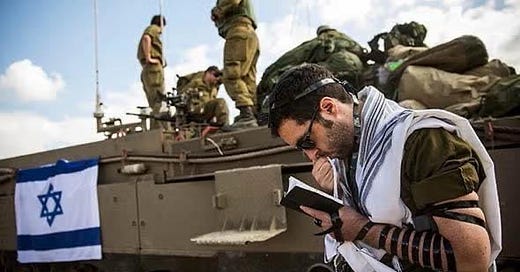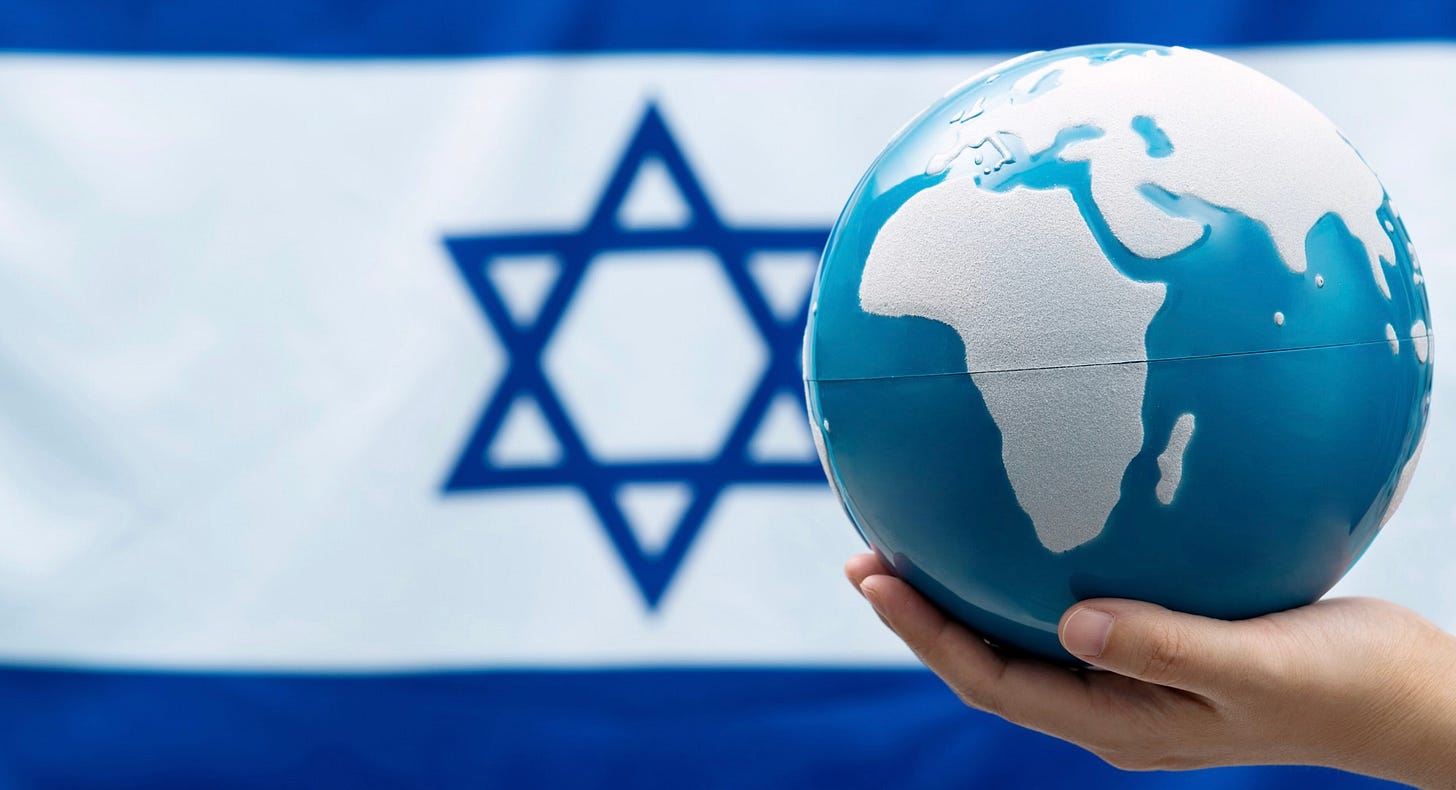Soldiers Upon Shoulders
“The giants of our past have taught us how to be brave. Jewish persecution is as old as time, but Jewish valor is eternal.”
By Beth Perkel
I spent a good part of last weekend mesmerized by the biography of Rabbi Shlomo Goren, the first chief Rabbi of the IDF. It was a fortuitous time for thinking about the miraculous underpinnings of our nation as the Jewish people were celebrating Sukkot this past week – a holiday in which we remember G-d’s miraculous protection of our people as they journeyed through the desert on their way toward experiencing their first steps in the Holy Land as a nation.
Rabbi Goren’s book picks up the story thousands of years later as the Jews of the 1930s and 1940s struggled to return to the Holy Land and rebuild their birthright. Rabbi Goren’s tenacious survival, as he managed to outrun and outwit so much danger, destruction, and battles in the early years of our fledgling stage of Israel, seems to parallel the history of the Jewish people itself.
The accounts in the book are nothing short of incredible:
Rabbi Goren’s family joining a group of hassidim, leaving comfortable homes and businesses in Europe to go to Israel almost penniless.
Years of joyously draining miles of swampland living with near-constant malaria in order to create a parcel of land big enough to build a community.
Stories of the siege of Jerusalem where Rabbi Goren had to walk around the city under near incessant gunfire – he had neither car nor phone – to deliver everything from messages to matza for soldiers on Passover.
Recruiting Yeshiva students to spend all Sabbath night illegally digging undercover trenches to stop Jordanian tanks from attacking the Jewish neighborhoods of Jerusalem. The Jordanians, who had hoped their tank invasion would be a surprise attack, ended up on the receiving end of the surprise as their tanks overturned into the freshly dug trenches.

The lives that the early settlers had to lead before the State of Israel had the infrastructure of a real army and government to defend their right to live in the land of their forefathers, is a lesson in bravery and grit.
Page after page, I kept thinking about how far the State of Israel has come and how much stronger, safer, and better off it is now… And then I turned my phone on after the holiday was over (my holiday observance precluded the use of a phone) only to feel like the pages of our history were being turned back once again.
What I saw was surreal. What I read couldn’t possibly be happening. It was all a visceral reminder of how as Jews, it often feels like our progress is a spiral staircase: gaining height but no ground. Somehow ending up back in the same spot looking over into an abyss.
When they say “history repeats itself,” it is eerily resonant with our history. All we want to do is live in peace, and yet our enemies will not permit this. There is a well known description of the Jewish people by the biblical prophet Balaam: “They are a nation that dwells alone and will not be rendered among the nations.” These words continue to bounce off the walls of the echo chamber of history.
All of which begs the question: how can we comfort each other as we endure this yet again? As we watch in horror as Israel and everything it stands for is attacked – while much of the world still remains silent in the face of such atrocities?
The famous medieval biblical commentator Rashi explains at the end of this week’s Torah portion (the first one of the new cycle of Torah reading that has just begun for Jews around the world) that the Hebrew word nechama, which we normally translate to mean “consolation”, actually means מחשבה אחרת – to think a different way. The 16th century biblical commentator Maharal, in his book Chiddusheh Aggadot, widens this to explain that the essence of consolation is when a person becomes able to look at the very same situation that brought him agony with a new understanding of what occurred. And because of that new thinking, he is able to transcend the tragedy, to see things in a larger panorama.
This provides a deep insight not only into how we can provide comfort in regular life during those enigmatic “shiva visits” (the 7 days of mourning following the death of a close family member), wherein we awkwardly meander around a living room not knowing what we could possibly say to make our dear ones feel better. But also on how to approach the current situation as we try to think of what we can possibly do to help our brothers and sisters in the Jewish homeland.
Doom-scrolling certainly isn’t the answer. It is a net loss, as most of our social media feeds are sapping us of our strength rather than bolstering us to go give support to those we know in Israel. Psychologists say that it is a form of “survivor’s guilt” – we are not there in Israel and so we feel helpless in a way that makes us not know what else to do other than stay up to date on the minute-to-minute information.
But who does that help? We live in a generation of information-overload where we are often overwhelmed by the flow of messaging, rather than accurately and appropriately informed.
I believe this Jewish idea of “comfort” being synonymous with “new thinking” can be applied to help us navigate how to help from so far away during what is happening right now. As Jews, we know that there is always a much bigger story unfolding in the expanse of our history than in our current trials and tribulations. When we get mired in the moment – this pinprick of time for an eternal people – it is hard to see anything but the pain of NOW. But we know as a nation that has stood the test of time through the very worst of challenges – there is always more to the story. A deeper message amidst the noise and the haste. And thus, we must remind each other to hold on tight and widen our scope.
Just today, one of my writing consulting clients reached out to me to try to figure out how to invite his community to the bris (circumcision) of his son who was born on the first day of the war. “How can I invite people to a joyous event?” he asked, clearly experiencing a wide range of emotions. “This baby’s birth was miraculous and yet I feel it is inappropriate to celebrate given everything that is going on.”
I reframed the issue with new thinking: I reminded him that while it seems like an incongruous time to be hosting a joyous celebration, in some ways it is the most opportune time in that the particular celebration of welcoming a baby into the world tangibly demonstrates the netzach Yisrael (eternal nature) of the Jewish people. That no matter how much the nations of the world try to destroy us, we continue to bring children and new Jewish life into that same world. And in doing so, it is a celebration of everything we stand for as Jews and the best way to counteract the targeted attempts at annihilation that seem to follow us in every generation.
With that in mind, we lovingly wrote up an invitation that was equal parts invite and a call-to-spiritual-arms. A celebration not only of his son's entrance into the world, but the eternal nature of our nation.
Now is the time to help the Jews in Israel be comforted by seeing their current pain in a new light: that they are not alone. That they are supported by their extended family scattered over all four corners of not only the globe, but the universe. That those who have come before us laid the cornerstone for our nationhood and the right to live in peace within the borders of Israel. And that those who have died for its sake serve as a beacon for us to continue the chain in defending this same right.
We also read in this week’s Torah portion (Genesis 4:10): “The blood of your brother calls out to me from the ground” – Israel has been attacked before. It will likely be attacked again. But we will continue to defend our right to existence with new thinking built upon eons of wisdom from those who have defended the land before us – weaving our tapestry of eternity.
The proud members of the Israel Defense Forces are now poised to do what they must, just as they always have. More than 350,000 reservists have been called up and are ready to serve.
Jews the world over are not only filled with gratitude for this generation of IDF soldiers; we have immense confidence in their abilities and in their commitment to their country and the Jewish people. But this is not simply because they have trained and readied for this moment – it is also because they are standing on the shoulders of giants…
As I continue to read Rabbi Goren’s book and see the hardships that earlier generations in the State of Israel had to endure to bring us the beautiful state we have now, I deeply feel that the valorous warriors of our past are never really gone. Their victorious battles for survival literally reverberate in succeeding Jewish generations and have created the muscle memory we need again now. Through their bravery, they taught us how to be brave. We have done this before.
In my mind’s eye, I see every soldier out there on the front lines of Gaza as if their army boots are firmly planted on the shoulders of those giants who came before them. This lift gives them a better vantage point on so many levels. Jewish persecution is as old as time, but Jewish bravery is eternal.
May G-d protect each and every one of our soldiers and swiftly and safely return the Jewish hostages to their homes, with peace coming quickly to Israel.
Am Yisrael Chai.
Beth Perkel is the author of Light at the Beginning of the Tunnel: Wiring our Children for Happiness, and hosts the podcast: Ideas That Change Lives.
To support IDF emergency needs, please visit Friends of the IDF.
If you like what you’re seeing at JEWDICIOUS, pass it along! Annual subscriptions to all content from our “Original 18” are FREE till the end of 2023!
From unpacking history and politics to navigating the nuances of family and personal relationships to finding the human angle on sports and entertainment — plus our unsparing take on what’s happening in the Jewish world — the canvas at JEWDICIOUS is limitless! JOIN US!!





